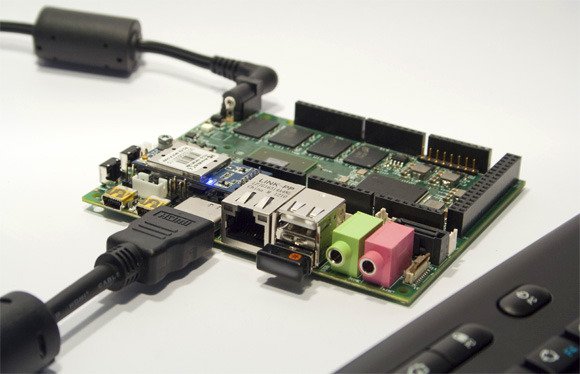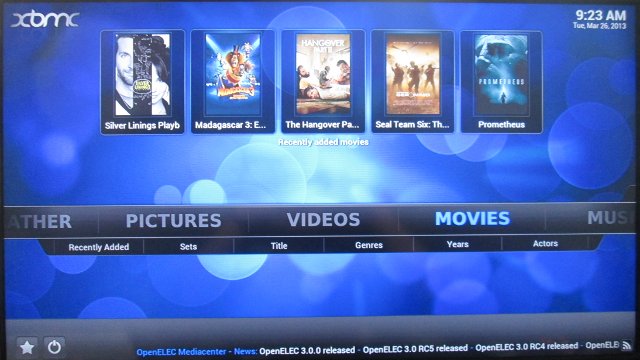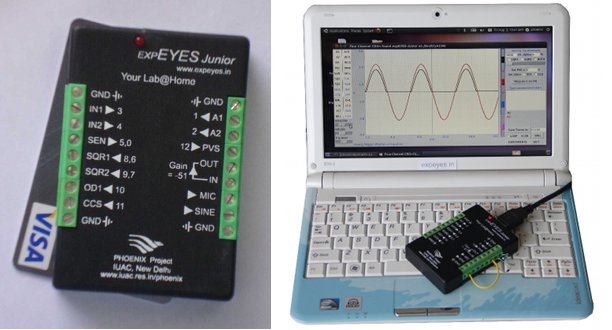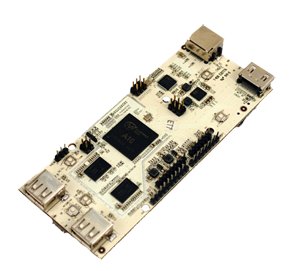Have you ever dreamed of a single board with the power of 4 Raspberry Pi and Arduino Due functionality? This dream should soon become reality thanks to UDOO single board computer. This open source hardware board is powered by Freescale i.MX6 Dual or Quad with 1GB RAM, as well as Atmel SAM3 Cortex M3 MCU that provides access to Arduino compatible headers. Here are the specifications of the board: SoC – Freescale i.MX6 ARM Cortex-A9 CPU Dual/Quad Core @ 1GHz + Vivante GPU MCU – Atmel SAM3X8E ARM Cortex-M3 (same as Arduino Due) System Memory – 1GB DDR3 Storage – micro SD (boot device) + SATA (i.MX6 Quad only) Video Output – HDMI and LVDS + Touch (I2C signals) Audio I/O – Analog Audio and Mic Expansion Headers – 54 Digital I/O + Analog Input (Arduino-compatible R3 1.0 pinout) Connectivity Ethernet RJ45 (10/100/1000 MBit) WiFi Module USB – mini USB […]
Design West Summit – 23-25 April 2013
Design West 2013, previously known as the Embedded Systems Confertence, will take place later this month, on 23-25 April to be exact, at San Jose McEnery Convention Center in San Jose, California, US. The event will be divided into 22 tracks dealing with software development, hardware design, operating systems, security and more: Android Certificate Program – Two-day hands-on embedded android workshop. Black Hat Summit – The Black Hat Embedded Security Summit will provide electronics professionals with essential information and tools, as well as a forum for the discussion and evaluation of the latest solutions for securing their embedded systems. Training courses will focus on topics such as Network Security, Incident Response, Web Application Security, and Exploit Development. Connectivity and Networking – The Connectivity and Networking track educates design engineers on wired and wireless communications, spanning need-to-know topics from essentials of USB device development to antenna and RF system design. Debugging […]
$25 Expansion Board for the Raspberry Pi
There are already several expansion boards for the Raspberry Pi such as the Gertboard or RaspiComm, but none of them originated from China. Onebir spotted a new expansion board from a Chinese supplier on Aliexpress that’s available for $25 including shipping. There’s no description on the seller website, the seller provided us some details in Chinese. With Google translate help, the key features of the board(s) can be summarized as follows: 3.3V / 5V SPI interface 3.3V / 5V I2C interface Opto-isolator for GPIOs supporting 8-channel 50V/600mA to control motors, drive LEDs, etc… Power LED (The pictures are crap, but I can’t see any LEDs on the boards) External power fuse to protect the expansion board and the Raspberry Pi. The features in Chinese are shown below in case something was lost in translation: 1.全尺寸完美兼容树莓派, 2.将3.3V的SPI接口转换为通用的5V SPI接口(并且可以通过P13跳线切换回3.3V) 3.将3.3V的I2C接口转换为通用的5V I2C接口(并且可以通过P13跳线切换回3.3V) 4.GPIO放弃光耦隔离方式,采用芯片驱动,支持8路50V、600mA的高电压大电流驱动,意味着可以直接连接舵机,驱动LED等等(要做小车,机器人,智能家居,远程控制的必备哟) 芯片采用插座方式, 不小心烧坏以后方便更换 5.增加LED电源灯 6.外接电源使用保险丝,更好的保护你的扩展板和树莓派 I’m not even sure this “expansion […]
OpenELEC 3.0.0 on Raspberry Pi – Installation and Video Tests
Yesterday, OpenELEC developers announced the release of OpenELEC 3.0.0, a lightweight OS running XBMC Frodo 12.1 for several platforms including the Raspberry Pi (OpenELEC stands for Open Embedded Linux Entertainment Center). When the Raspberry Pi was initially released, I did not feel like testing it as a media center, mainly because of codecs limitations. But over time, this has improved with the availability of MPEG-2 and VC-1 codecs (for a fee), and GPU accelerated support for free codecs such as VP6 and VP8, so today I’ve tested to give a try and install OpenELEC 3.0.0 on my Raspberry Pi. I’ll first give installation instructions, then test several types of videos container formats, and video / audio codecs, as well as give some quick impression about the performance and stability of OpenELEC on this low cost board. Installing OpenELEC on Raspberry Pi To install OpenELEC, I basically followed the instructions provided […]
$35 expEYES Junior Transforms the Raspberry Pi, Aakash2 Tablet or any Linux Powered Device into an Electronics Lab
I remember in high school in France, our class only had 2 oscilloscopes and few other electronics equipment, needless to say I did not actually get to use an oscilloscope until I went to university. It would have been nice to be able to play around with oscilloscopes, frequency generators, etc… earlier, but due to budget constraints, this was not possible. Dr Ajith Kumar, a scientist working with the Inter University Accelerator Centre of India, has spent several years working on an ultra low cost electronics lab composed of an oscilloscope and a signal generator to provide students attending schools that cannot afford regular equipments. This learning & experimentation tool is called expEYES, and a prototype was demonstrated last year with the Raspberry Pi. At the end of last year, the final version called expEYES Junior (aka expEYES 2.0) was announced, and is now available to schools and hobbyists in […]
$59 pcDuino – AllWinner A10 Board with Arduino Compatible Headers
pcDuino is a new development board based on AllWinner A10 Cortex A8 SoC that comes with 1GB RAM and 2GB NAND Flash, HDMI output, as well as USB and Ethernet RJ45 ports, and is said to feature 2.54mm pin headers compatible with Arduino boards. Here are the pcDuino specifications: SoC – AllWinner A10 ARM Cortex A8 CPU @ 1GHz + Mali-400 GPU System Memory – 1GB DRAM Storage – 2GB Flash + SD card slot for up to 32GB Video Output – HDMI USB – 2x USB 2.0 Host Connectivity: Ethernet – 10/100 Mbps (RJ45) Wi-Fi – Via USB Wi-Fi dongle (not included with the board) Headers – 2.54mm pin headers: 1x UART, 6x ADCs, 2x PWMs up to 24MHz, 14x GPIOs, 1x I2C and 1x SPI. Power Supply – 5V/2A Dimensions – 125mm x 52mm The board comes preloaded with Ubuntu 12.10, but it also supports Android 4.0 ICS. […]
Open ARM GPU Drivers FOSDEM 2013 Video and Call to ARM Management
As I previously wrote, FOSDEM organizers are slowly uploading FOSDEM 2013 videos. One of the most interesting talk “Open ARM GPU Drivers” is now available. I’ve also uploaded it to YouTube (embedded below) to give it more exposure. Luc Verhaegen has also written a recent blog post entitled “Hey ARM!” where he announces the release of the modified source for Quake 3 Arena demo, and asks ARM to join them in making an open source driver. Open ARM GPU Drivers @ FOSDEM2013 This session covers the following key points: Problem – Binary drivers are mainly designed to run in Android, and it’s very difficult to have proper GPU drivers for Linux, and companies are not interested to release open source drivers or even just documentation, as they are not convinced it will benefit them in any way. Legal – This is actually the main issue, as open sourcing existing driver […]
Linux Conference Australia and FOSDEM 2013 Videos are Now Online
FOSDEM 2013 took place last week, and the organizers are in the process of uploading videos. Up to now, 5 main tracks sessions have been uploaded (Firefox OS; Free, open, secure and convenient communications; FreedomBox 1.0; Samba 4; and systemd, Two Years Later) as well as over 20 lightning talks. You can find the videos at http://video.fosdem.org/2013. You may also want to check my previous post for a lists of interesting talks, and I’ll probably feature some FOSDEM 2013 videos in this blog, at least the open source GPU driver talk. Linux Conference Australia took place on January 28 – February 1, 2013, and the 5-day conference featured lots of talks including several dealing with graphics in Linux, and one developer apparently trashing X in terms of complexity and performance, and explaining how Wayland was better. Others Linux sessions dealt with subject such as 3D printing, supercomputing, Arduino, big.LITTLE processing, […]










